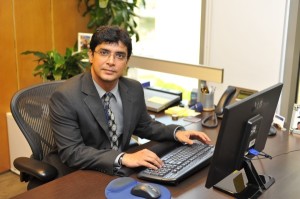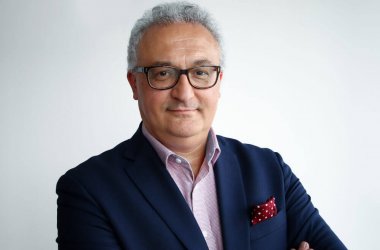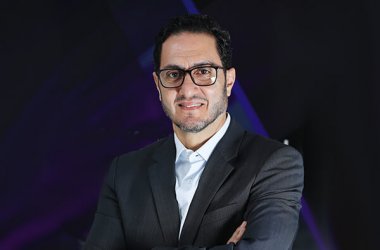 If there’s a new challenge to overcome, Zubair Ahmed, Head of IT and Business Innovation, Emirates Islamic Bank, is the one who’s likely to take it up. Over a career spanning more than 20 years in IT and banking, he’s always carried a desire to take on something new and exciting, and it’s exactly that quality that brought him to where he is today.
If there’s a new challenge to overcome, Zubair Ahmed, Head of IT and Business Innovation, Emirates Islamic Bank, is the one who’s likely to take it up. Over a career spanning more than 20 years in IT and banking, he’s always carried a desire to take on something new and exciting, and it’s exactly that quality that brought him to where he is today.
By his own admission, Ahmed is very much a product of the Middle East. Having been born in his homeland, Pakistan, his family quickly moved to Kuwait, where he spent his early years, and then to Dubai, where he grew through adolescence into an adult. That said, Ahmed did allow himself a brief stint back in Pakistan after completing his A-Level exams in Dubai.
“At that time, the universities here are not as we see them today. Options were limited, so then I went back to Pakistan, to a very sought-after school of computer science, and of emerging sciences. I did my computer science degree from there, then came back in 1992,” he says.
From the outset, Ahmed had pretty much decided that he wanted to be involved in IT. Ahmed’s interest in technology was born during a time when the field was much more humble that it is today. In those days, logical thinking and planning were the only ways to get your head around emerging technological trends, and he enjoyed putting his mind to the test when it came to conquering new developments. What’s more, his desire to jump into challenges head-first, which he still holds to this day, drew him to the emerging world of computers and IT.
“I had an analytical mind to start with. I was very, very interested in the designs and the mathematics of everything. Computers were coming about, there was a lot of buzz, even though there was no Internet and so forth, but I was of the reading kind. There was always a desire to venture into the unknown, which remains to this day. That desire is quite important to have, so you can have the appetite for experimentation, for innovation. That led me to computer science, and I think the timing was right because it was just about becoming mainstream,” he explains.
Ahmed looks back at those times with fond memories, he says, as he describes the first PC that he bought. The machine didn’t have a hard disk, so he had to boot it up using a floppy disk. “You tend to appreciate the technology even more if you come from those humble, early beginnings of IT,” he says.
Having attained his degree in computer science, then, Ahmed looked to test out his new skills in the banking sector. According to him, banking is the career of choice for many Pakistanis, and so he decided to combine his love of technology with the ideal career path. He joined Dubai’s Mashreq Bank in 1992, and began his long-spanning career through IT in the banking industry.
“The desire was to use technology in the most prudent fashion. Banks, as we know them even today, spend heavily on IT, so you might as well be associated with the type of business that really focuses on and utilises the strength of technology. Then you get to do more new things and so forth. Those were the two aspects that brought me to banking, and I have no regrets so far,” he says.
When Ahmed first started at Mashreq, he was programming ATMs and point-of-sale machines, largely using machine code. From this he gleaned invaluable experience on how automation works, and used it as the basis to carry on up the career ladder. Whether he had intended to or not, he ended up working up at Mashreq for 10 years, though he explains that his drive for new challenges and experimentation meant to that he got to see almost every aspect of the business.
“Every two years, I wanted to leave because I wanted change. Whenever I wanted change, the company provided me change internally, so that’s why I went from all sections of the bank—I understood the back office, the front office, the branches, the call centres, the retail, the corporate, the treasury, so that was fantastic and it was a great school for me,” he says.
In 2002, Mashreq gave Ahmed the biggest change of his career so far, asking him to help form a new company within the Mashreq group called Mindscape Information Technology. The idea was to bring together experts who really understood the banking business, as well as the technology that helped to drive it. The company would then provide solutions to local banks through partners, such as Oracle and Microsoft, as well as consulting services. It could almost be defined as a systems integrator for the banking industry.
Ahmed’s position in the company centred on enterprise quality, and the four years working at Mindscape would shape his outlook on professional and personal life. When the company started in 2002, the business heads decided to achieve Capability Maturity Model (CMM) certification, a prized framework on software quality started by the Software Engineering Institute (SEI) in the United States, and Ahmed would lead the internal transformation to achieve the certification.
“At that time, in 2002, there was no installation here for CMM except for one, which was the Saudi American Bank. There are five levels of maturity, so Saudi American Bank was the first one, and they had only reached level three. We gave ourselves a very aggressive target of becoming CMM-certified, not because of the label of it, but it was chosen to change the culture within,” he says.
A year later, Mindscape had achieved its level-three certification, and the process drastically changed Ahmed’s career. He describes himself as becoming a change agent during that year, helping Mindscape customers and clients to develop software in a different and more productive way.
“That, for my career, really helped because I got into behaviour management with an IT focus,” he says. “I started leading that practice because there was a grave need in the market for it. Then I started getting responsibility on that line of business, for which I entered projects for a number of banks in the region—helping them, strengthening their quality.”
But after four years at Mindscape, it was time for another change—after all he had been at the Mashreq Group for around 14 years by this point. “You exhaust all options. It was a fruitful journey, but then the craving was there to do it differently, to do it in a place where you don’t know anyone, and then experiment a bit. Again, that experimentation and innovation thing kicked in,” he explains.
Craving an utterly new experience, then, Ahmed took up employment at Dubai Bank, where he stayed for four more years, before Dubai Bank was integrated with the Emirates NBD Group in 2011, becoming Emirates Islamic Bank. Ahmed’s role was solidified as Head of IT, and he has continued to remain at the bank ever since.
However, never one to renounce his desire for fresh thinking, Ahmed has also taken on the role of Head of Business Innovation, which keeps his hunger for experimentation well-fed.
“I have a function that works with businesses to innovate what matters to the business. It might use technology, it might not use technology. My thinking is that innovation is by trigger, it’s by choice, and it can happen regardless of your background. It’s all about pushing yourself to a space of creative thinking. We apply tools, we use idea tools for creative thinking from a formal perspective and we’ve done that in the last 12 months with tremendous success,” he says.
This way of formalising creative thinking is heavily influenced by the days working for Mindscape and the CMM-certification, Ahmed says. Indeed, he takes the concepts to heart so much that he has even been applying them to his four children. Having seen enormous success from the results of this experiment, Ahmed was persuaded by friends and family to write about this style of parenting, and so, in 2013, Ahmed’s first book, Power to Kids, was published in the US.
“It’s all about bringing management and quality principles to parenting. It’s all about root cause analysis that we do, the strategy and, the planning,” he says.
So, as a highly regarded IT and business head, a published writer, and CNME’s future CIO of the year (see page 47), what could Ahmed’s next challenge in professional life possibly be? He simply says that he is aligned with the goals of Emirates Islamic Bank, and that he will continue innovating in his current position for the foreseeable future.
“If organisations are good enough to capture your interest and your passion at the belief level, then people stay and they don’t stay back for money. I find myself exactly in that position because my direction is completely aligned with what an Islamic bank is aiming to do for itself,” he says.





